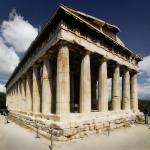|
This section contains 1,229 words (approx. 5 pages at 300 words per page) |

|
Escaping the Logic of the Eleatic School.
Both Empedocles and Anaxagoras attempted to evade the ruthless logic of Parmenides and the Eleatic School of philosophers who argued that there are two opposites, "that which exists," which is matter, and "that which does not exist," which obviously does not exist. Since the world is composed of matter which does exist, it fills all the available space. Thus there can be no motion, for motion implies that there is empty space into which an object in motion can move, and there is no empty space. Parmenides' follower, Zeno, proved to his own satisfaction that an arrow in flight only appears to move. In actuality, at any given point in its apparent flight, it is at rest. To escape from this logic, someone had to produce a theory to prove that empty space was not the same...
|
This section contains 1,229 words (approx. 5 pages at 300 words per page) |

|




